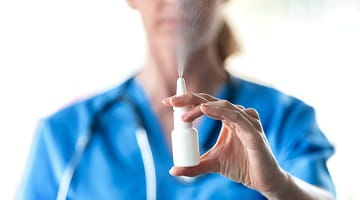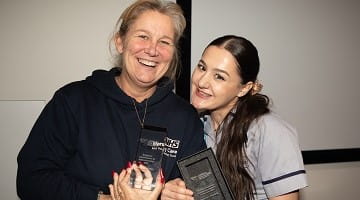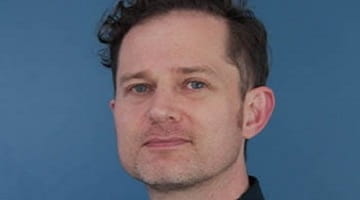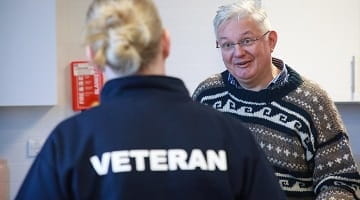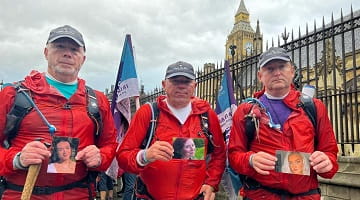Why study this course with LJMU?
- LJMU ranked 2nd in the UK for health professions courses (The Guardian University Guide 2025)
- LJMU ranked 11th in the UK for paramedic science (The Guardian University Guide 2025)
- A wide range of quality placement opportunities
- A programme delivered by HCPC registered paramedics
- Supported in a multi professional learning environment
- Excellent supervision and support in practice settings
- Evidenced based education and learning
- £5,000 per year NHS training grant, plus another £2,000 for students with dependent children (eligibility criteria apply)
Please note: This course is currently not accepting new applications for September 2025 entry.
About your course
BSc (Hons) Paramedic Science at Liverpool John Moores University gives you the opportunity to acquire the knowledge, skills and confidence required to become a registered paramedic. You will achieve the high standard expected of today’s health professionals, enabling you to work effectively at the frontline.
Working alongside other health professionals and emergency services, you will develop strong leadership skills and the ability to work independently, as well as being a member of a team. A good level of physical fitness is paramount as moving and handling of patients and equipment is part of the role.
Your placements will be in the most part with North West Ambulance NHS Trust (NWAS). They are the largest ambulance service outside London, providing emergency care for 7 million people across the region and responding to 952,000 calls each year.
As you progress under supervision, you will be challenged to adapt quickly as situations change. The course will help you develop the clinical skills, underpinning knowledge and interpersonal skills you need to care for people in distressing circumstances. Ultimately, you will have the confidence to work effectively and independently.
We utilise many practice areas within the Merseyside and Cheshire area, which include NWAS, accident and emergency departments, health centres, hospital operating theatres, maternity units, paediatric facilities, mental health facilities and critical care facilities. Each of these placements will add to your experience and development as a paramedic student.
We have excellent facilities within the university so that we can offer you simulated experiences to support your practice. You will benefit from multi-professional days when you will be working alongside and learning with midwifery and nursing students.
Course modules
What you will study on this degree
You will complete modules to a total of 120 credits at each level of your degree. All modules are 'Core'; this means all students on the degree will study them.
Levels 4 and 5 are both split 50:50 between theory and practice. At Level 6 there's more of an emphasis on practice with a 40:60 split, helping to prepare you for employment as a paramedic. Increased practice-based placements will allow for a greater depth of service user medical assessment in primary care settings.
Reflective Practice
Reflecting on your own and and fellow student paramedics' simulated clinical practice is a great way to help you develop skills, build confidence and prepare for real-world placements. To do this in the best way possible, we have invested in state-of-the-art recording equipment in each of our clinical practice suites and other teaching spaces. During specific modules, you will be asked to take part in the filming of both yourself and other students. The footage recorded is strictly confidential and must not be shared inappropriately or released into the public domain. Being professional and having respect for others must always be maintained. This strict confidentiality ensures you can be at ease and fully engage with your teaching and learning experiences. Each patient bay is equipped with two cameras and a microphone so you can record yourself completing a procedure - say practicing cannulation skills or wound dressing - and then watch it back to see how you did, spotting good practice or any areas for improvement. It's truly a transformative way to learn and hone your skills!
This course is currently undergoing its scheduled programme review, which may impact the advertised modules. Programme review is a standard part of the university 's approach to quality assurance and enhancement, enabling us to ensure that our courses remain up to date and maintain their high standard and relevancy.
Once the review is completed, this course website page will be updated to reflect any approved changes to the advertised course. These approved changes will also be communicated to those who apply for the course to ensure they wish to proceed with their application.
Further guidance on modules
Modules are designated core or optional in accordance with professional body requirements, as applicable, and LJMU’s Academic Framework Regulations. Whilst you are required to study core modules, optional modules provide you with an element of choice. Their availability may vary and will be subject to meeting minimum student numbers.
Where changes to modules are necessary these will be communicated as appropriate.
Core modules
Core modules
Core modules
Professional accreditation
Successful completion of our Paramedic Science degree results In eligibility to apply for Registration with the Health and Care Professions Council, giving you the opportunity to practice anywhere in the UK.
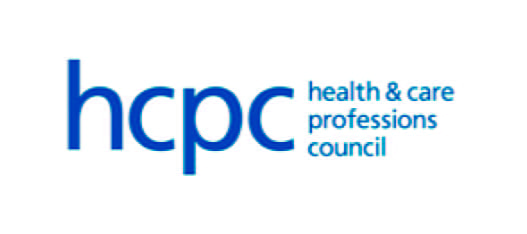
Your Learning Experience
Excellent facilities and learning resources
We adopt an active blended learning approach, meaning you will experience a combination of face-to-face and online learning during your time at LJMU. This enables you to experience a rich and diverse learning experience and engage fully with your studies. Our approach ensures that you can easily access support from your personal tutor, either by meeting them on-campus or via a video call to suit your needs.
We deliver our modules in a variety of methods. We appreciate that students learn in differing ways and we have the experience and understanding to support each individual through the programme.
Work-related Learning
The wide range of placements coupled with the evidence-based learning will offer you a unique insight into the profession of the paramedic. By designing your programme in this innovative way, we are confident that you will successfully develop your skills, knowledge and professionalism as you move closer to the point of registration with the Health and Care Professions Council.
Dedicated personal tutor, plus study skills support
In addition, you will be allocated a Personal Tutor at LJMU, who will give you feedback on how you are progressing with your studies and help you to plan for your educational and career development. The university also offer wider support for all of our students if needed.
Assessment varies depending on the modules you choose, but will usually include a combination of exams and coursework.
Your marks and feedback will be available within 15 working days of submitting a piece of work. That's because we believe that constructive feedback is vital in helping you identify your strengths as well as the areas where you may need to develop further.
Where you will study
What you can expect from your School
Part of the City Campus, the School of Public and Allied Health works with a wide range of health and social care organisations to design and deliver a dynamic suite of courses. In addition to clinical practice suite facilities, we have two full size specialist ambulance suites. You will also find high quality seminar rooms, IT suites and lecture theatres, plus a café and social spaces. The School's flagship Tithebarn Building adjoins the Avril Robarts Library.
Course tutors
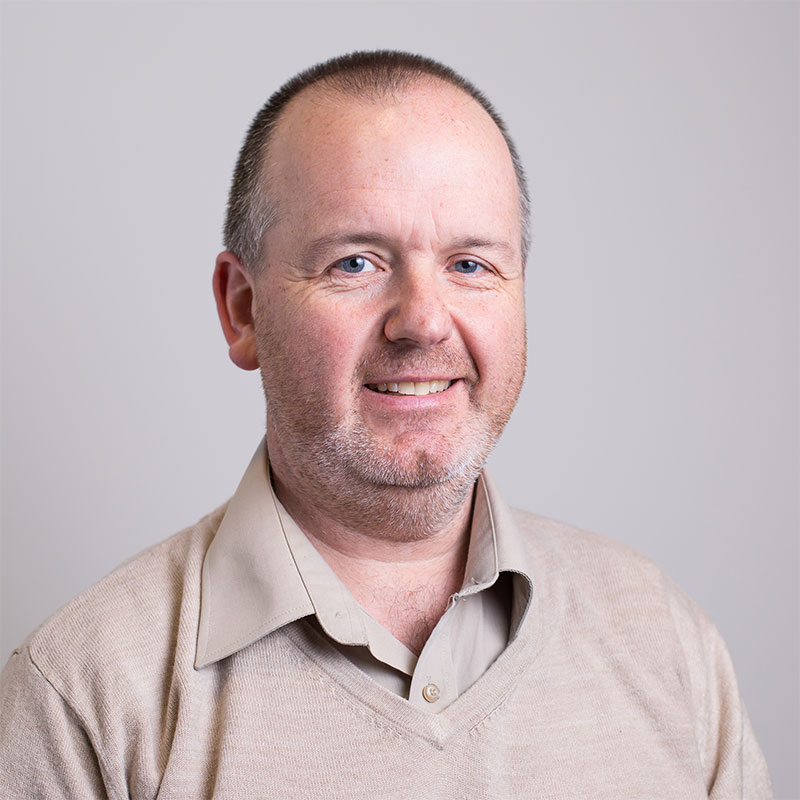
Jason Comber
- Programme Leader
I enjoy seeing the passion, enthusiasm and caring qualities in our students. I particularly enjoy seeing the development of each paramedic student throughout their education and clinical experience in university and in practice, and I appreciate that every student has a unique journey through the programme. As every paramedic student walks across the stage at graduation each footstep reminds me of their student story.
I enjoy seeing the passion, enthusiasm and caring qualities in our students. I particularly enjoy seeing the development of each paramedic student throughout their education and clinical experience in university and in practice, and I appreciate that every student has a unique journey through the programme. As every paramedic student walks across the stage at graduation each footstep reminds me of their student story.
Jason works as part of an amazing group of senior lecturers who form the Paramedic Team at LJMU. He began his career with the former Greater Manchester Ambulance Service (GMAS) in 2000, qualifying as a paramedic in 2001. Since then, he has progressed through the roles of Clinical Practice Trainer and IHCD Paramedic Instructor with GMAS, before the North West Ambulance Service Merger in 2006. Following this, Jason moved to an Advanced Paramedic clinical position within NWAS, managing a team of Senior Paramedics, providing clinical leadership and support to this team and to paramedics and Emergency Medical Technicians.
-
 Lecturer/Senior Lecturer
Lecturer/Senior Lecturer -
 Lecturer/Senior Lecturer
Lecturer/Senior Lecturer -
 Lecturer/Senior Lecturer
Lecturer/Senior Lecturer


As a student from Northern Ireland, paramedic science wasn't a course that I could do, as no universities offered it. As a result, I looked over to England and Scotland for paramedic courses. Finally, I found Liverpool John Moores and instantly fell in love.
Career paths
Once completing the programme, you will be eligible to apply for registration with the Health and Care Professions Council. This registration will allow you to practice anywhere in the UK as a paramedic.
Once you are a qualified paramedic and you start to build your experience, you can begin to consider progression within your chosen healthcare setting, weather that is with an ambulance service, primary care setting or any other form of NHS Trust or private organisation. You can also develop wider skills and educational pathways, which would support your future development.
The College of Paramedics offers advice and guidance on career and professional development and as a team we will be guiding and advising you.
Student Futures - Careers, Employability and Enterprise Service
A wide range of opportunities and support is available to you, within and beyond your course, to ensure our students experience a transformation in their career trajectory. Every undergraduate curriculum includes Future Focus during Level 4, an e-learning resource and workshop designed to help you to develop your talents, passion and purpose.
Every student has access to Careers Zone 24/7, LJMU's suite of online Apps, resources and jobs board via the LJMU Student Futures website.
Tuition fees and funding
- Home full-time per year:
- £9,535
Fees
The fees quoted above cover registration, tuition, supervision, assessment and examinations as well as library membership and student IT support with access to printed, multimedia and digital resources including programme-appropriate software and on campus Wi-Fi.
Financial Support
The University offers a range of scholarships to support students through their studies. You'll find all the information you need on our specialist funding pages, including details of the Student Support Fund and other activities to support with the cost of living.
Additional Costs
In addition to fees, students should also keep in mind the cost of:
- Accommodation
- Travel costs including those for placements, visas and travel for studying abroad and field trips unless paid for by LJMU
- Stationery, IT equipment, professional body membership and graduation gown hire
The University reserves the right to increase tuition fees in accordance with any changes to the maximum allowable fees set by the UK Parliament. In the event of such a change, any fee increase will be subject to a maximum cap of 10% of the total course cost as originally stated at the time of your offer.
- You may incur additional costs for travel to placement and parking. Reimbursement for this has not yet been identified or agreed.
- Students who would like to buy extra uniform items, further to their standard uniform which is included in the course fees, have the option to do so.
Not covered as part of the course or included in course fees:
- Provisional driving licence
- C1 Class driving licence training and test
Please read the driving licence information on the Entry Requirements tab. You can read more about the C1 licence requirement in the Frequently Asked Questions (FAQ) section on the College of Paramedics website.
Entry requirements
Please choose your qualifications below to view requirements
Grades/points required from qualifications: BBB - ABB (120 - 128)
Work out how many UCAS points your qualifications are worth by visiting the UCAS Tariff Calculator.
Qualification requirements
How to apply
Securing your place at LJMU
UCAS is the official application route for our full-time undergraduate courses. Further information on the UCAS application process can be found here https://www.ljmu.ac.uk/study/undergraduate-students/how-to-apply.
Please note: This course is currently not accepting new applications for September 2025 entry.
Please be aware that demand for LJMU's Paramedic Science degree is extremely high. Our recruitment quota is capped at 50 places. As we usually receive around 1,500 applications, we strongly advise you to ensure your application is carefully tailored to clearly address all of the entry and shortlisting criteria. Applicants will be assessed on assessment outcome, academic profile and the application as a whole. We aim to make all decisions on applications received prior to the January UCAS Equal Consideration Deadline by the end of February, however we may make some decisions earlier than this so applicants should check emails regularly. Please also ensure that the email you register with UCAS accepts emails from third parties.
Driving Licence
All applicants will require a full UK driving licence upon commencement of the programme. We also recommend that students should look to gain the C1 provisional entitlement on their driving licence as you will need to have completed both the theory and practical test in order to secure employment in many (not all) Ambulance Service NHS Trusts. It is understood that if you are seventeen years of age at the point of application then you cannot be expected to hold a full driving licence.
We are looking for evidence of understanding the wider context of the role. We want applicants to demonstrate their understanding and commitment to the profession.
We also require evidence of relevant experience in the field of health care. This may have been paid employment, voluntary or personal experience, but we will expect you to be able to communicate specific details of these caring opportunities and relate these to the role of a Paramedic and the NHS Core values.
Applicants should demonstrate a strong desire to continually develop and improve their skills as a student and ultimately as a registered paramedic. Evidence of professional reading such as the HCPC is required and excellent communication skills, good time management skills, a willingness to work flexible shift patterns are essential.
Applicants should demonstrate an ability to balance and combine academic study, clinical work and family/social life.
LJMU is able to offer direct entry to the second year of the programme under existing RP(E)L arrangement given the proven relevant experience and qualifications.
Please note: Due to the volume of applications, amendments will not be accepted once an application has been submitted.
If shortlisted, you will be invited to a selection process consisting of an individual interview. If successful, in addition to any conditions, all offers will be subject to:
- Satisfactory Medical Clearance/Examination
- We will contact you directly to undertake this
- Satisfactory Enhanced Disclosure and Barring Service check
We will contact you directly to undertake this and further information can be found at www.disclosure.gov.uk
In addition, applicants will have to follow Faculty procedures for declaring any convictions if successful after interview.
There is an expectation that you will fully prepare for employment with the ambulance service over the programme. You will be expected to complete a series of assessments involving moving and handling techniques. This is necessary to ensure that you have sufficient physical ability to cope with extreme work demands as and when these occur and minimise health or injury risks. The university will offer support through theory and practice in terms of techniques, skills and equipment to be used.
Your university life
From accommodation and academic support to clubs and societies. Find out what LJMU has to offer.
Related Links
Talk to our students
Connect with a current LJMU student for advice and guidance on university life, courses and more.
See what our students are saying
At LJMU we want you to know you're making the right choice by studying with us. You can see what our students are saying about their experience with us via the following websites:
Related Links
News and views
Browse through the latest news and stories from the university
The university reserves the right to withdraw or make alterations to a course and facilities if necessary; this may be because such changes are deemed to be beneficial to students, are minor in nature and unlikely to impact negatively upon students or become necessary due to circumstances beyond the control of the university. Where this does happen, the university operates a policy of consultation, advice and support to all enrolled students affected by the proposed change to their course or module.
Further information on the terms and conditions of any offer made, our admissions policy and the complaints and appeals process.























